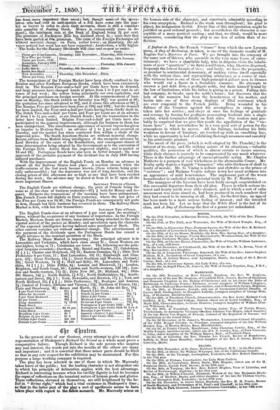C4t quirts.
In the present state of our theatres, every attempt to give an efficient representation of Shakspere's Richard the Second as a whole must prove a comparative failure. Though Richard is the solo person who inspires any real interest, the words put into the mouths of the others are many and important ; and it is essential that these minor parts should be filled so that at any rate respect for the exhibition may be maintained. For this purpose a large working company is required. The play has been selected as one of those in which Mr. Macready takes leave of the publio ; but the leading character is not altogether one to which his principle of delineation applies with the best advantage. Richard is interesting because when his earthly dignity is lost he becomes the organ of reflections on the transient nature of human goods and glories. These reflections, elevated in themselves, are still heightened by the be- lief in " divine right," which had a vital existence in Shakspere's time ; so that in the latter part of the play a sort of apotheosis seems to have taken place with regard to the Men monarch. Mr. Macready seizes on the human side of the character, and constructs admirably according to his own ceneeptiern Richard is the weak man throughout ; his grief is abject, his indignation fretful. Every line of this interpretation might be justified on good rational grounds ; but nevertheless the character is sus- ceptible of a more poetical reading ; and that, we think, would be more impressive, considering that the play is one less of action than of re- flection.
























 Previous page
Previous page